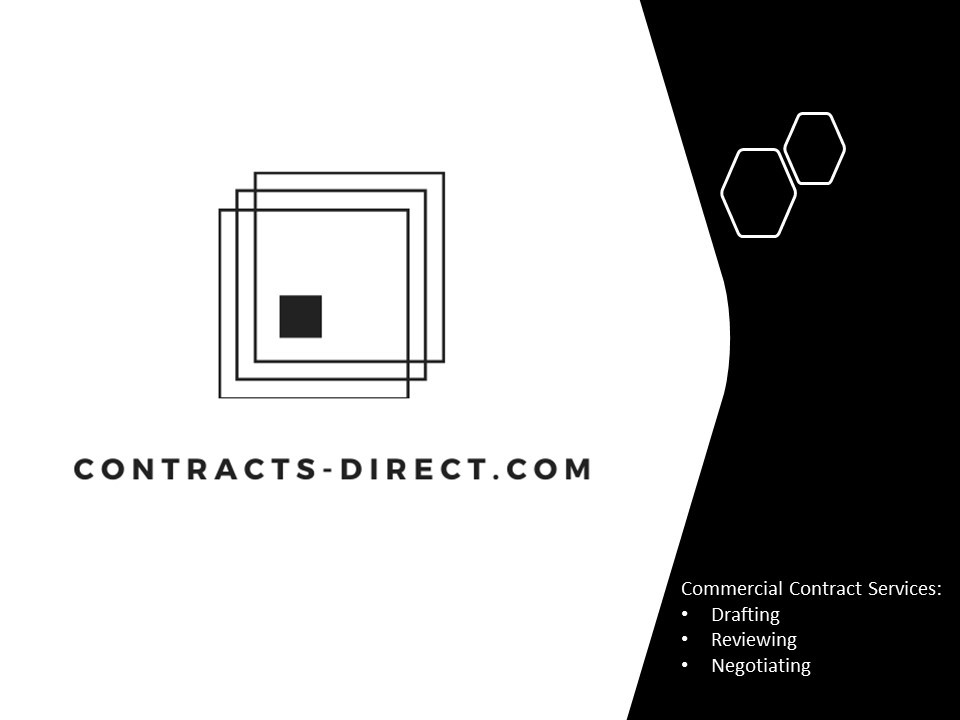FAQ
What is the best use of Contracts-Direct?
At Contracts-Direct, we aim to give you the functionality of a commercial contracts manager.
Our simple but important objective is to provide your business with cost effective and timely support when you are dealing with the formation of a business contract.
We can do any or all of the following for you:
And if we feel that for any reason we can't help you, we'll tell you straight away so you don't waste your time.
Contact us with you requirements.
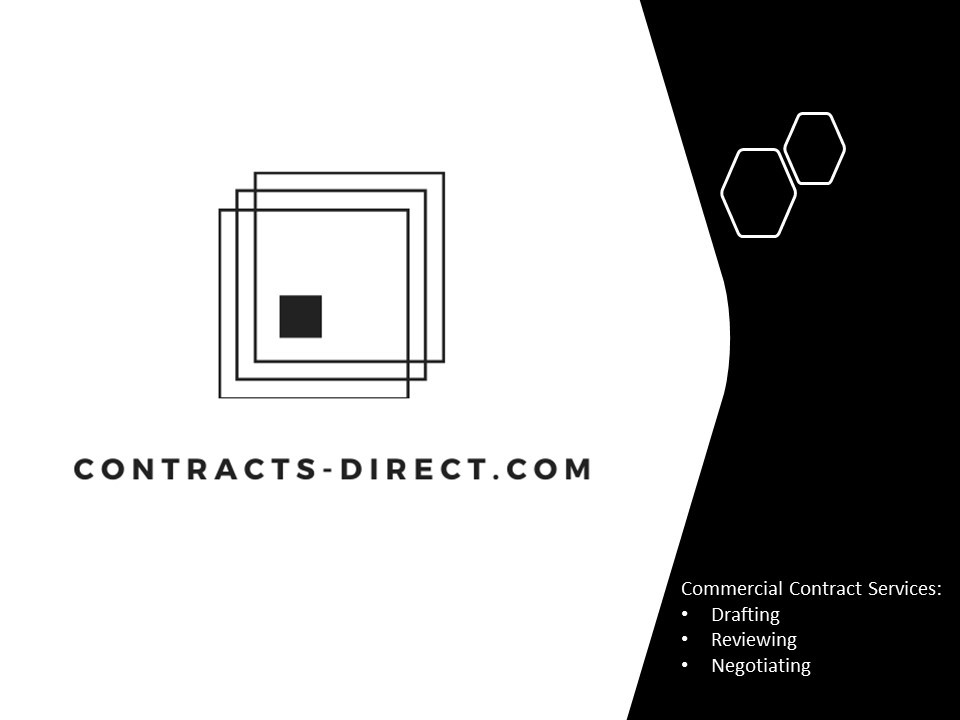
Our simple but important objective is to provide your business with cost effective and timely support when you are dealing with the formation of a business contract.
We can do any or all of the following for you:
- Draft a contract from scratch that is either 'neutral' so you can decide what tweaks and changes are needed to reflect your commercial needs, or prepare one that is more 'bespoke' to include your more detailed requirements.
- Review and comment on a draft contract that you have prepared yourself or that you have received from your counter-party.
- Amend and repair a contract that is in circulation between your business and a counter-part.
- Help negotiate your commercial contract.
And if we feel that for any reason we can't help you, we'll tell you straight away so you don't waste your time.
Contact us with you requirements.

Who can we help?
The answer we can help the following and many others besides in need of our bespoke commercial contract services, please just ask us:
Please see our pricing policy including Easy Pay.
Services are subject to our Terms of Business.
Contact us with you requirements.

- Business owners
- Entrepreneurs
- Commercial managers
- Start-ups
- Trading companies
- Service businesses
- Sole traders
- Contract negotiators
- Company executives
- Trade Associations
- Charities
- Chambers of Commerce
- Consumer groups
- Line managers
- In-house Counsel
- Professional firms
Please see our pricing policy including Easy Pay.
Services are subject to our Terms of Business.
Contact us with you requirements.

Who have we helped so far?
Our clients are based up and down the UK and we can service any region because we offer an online business model, so geography is not a problem when it comes to delivering contract support.
We have worked across multiple business sectors:

We have worked across multiple business sectors:

What experience do you have?
Here are some of the more recent things we have helped clients with, and then of course there are the many years of professional commercial legal practise experience that went before that:
For more about our Services.
Please see our pricing options including Easy Pay.
Services are subject to our Terms of Business.
Contact us with you requirements.

- Drafting services agreements
- Preparing and reviewing website T&Cs
- Reviewing and amending non-disclosure agreements
- Drafting Sales Agency Agreements for UK consumer products
- Review & amend Charity's sponsorship and fund-raising agreement
- Drafting website terms and conditions
- Reviewing shareholders' agreements
- Reviewing business sale and purchase documentation
- Drafting heads of terms for joint venture
- Drafting collaboration Memorandum of Understanding
- Undertaking due diligence on property and related assets
- Commercial leases
- Project managing contract reviews and responses
For more about our Services.
Please see our pricing options including Easy Pay.
Services are subject to our Terms of Business.
Contact us with you requirements.

What is your pricing?
We have a very clear and straightforward pricing policy for our services that offers great transparency and cost effectiveness for businesses.
Contact us with you requirements.
Contact us with you requirements.
How do your fees compare?
We know the thought of incurring legal fees can be a big turn-off for any business. This is one of the reasons we have set up Contracts-Direct.com.
Time-based fees vary from law firm to law firm and regionally.
Unbiased.co.uk gives some clues on some typical services you might need and the average cost you can expect to instruct a solicitor for business. In our experience, even these average costs are on the low side (e.g. a shareholders' agreement) and there's VAT at 20% on top as well to consider:
Lawyers in the larger commercial firms charge higher fees and enjoy correspondingly generous returns- this list of earnings provides an insight. For the most part, these are all very well run professional businesses, but we know that many SMEs cannot afford their services.
For comparison, even a trainee lawyer's average salary is often greater than a SME owner's, and payscale.com says that:
"An early career Small Business Owner / Operator with 1-4 years of experience earns an average total compensation (includes tips, bonus, and overtime pay) of £32,500 based on 11 salaries. A mid-career Small Business Owner / Operator with 5-9 years of experience earns an average total compensation of £25,962 based on 7 salaries. An experienced Small Business Owner / Operator with 10-19 years of experience earns an average total compensation of £26,015 based on 12 salaries. In their late career (20 years and higher), employees earn an average total compensation of £35,493."
The Government website provides further guidance on hourly fee rates for lawyers.
Time-Based billing
This is the most common way solicitors bill for their services. Rates vary between cities, regions, and even within towns. This legal fees map gives regional guidance to fee rates in an easy-to-compare way.
Fairly typical fees per hour in the midlands, are:
Therefore, our aim is to get you and your business off to a racing start without breaking the bank or requiring you to take out a second mortgage.
The great benefit we offer is that you get years of commercial contract drafting and negotiating experience at a fraction of the usual cost of a lawyer.
For more about our Services. Please see our pricing options including Easy Pay.
We're not here to do the lawyers out of business. They have (and will always have) an important role in giving legal advice.
Services are subject to our Terms of Business.
Contact us with you requirements.

Time-based fees vary from law firm to law firm and regionally.
Unbiased.co.uk gives some clues on some typical services you might need and the average cost you can expect to instruct a solicitor for business. In our experience, even these average costs are on the low side (e.g. a shareholders' agreement) and there's VAT at 20% on top as well to consider:
| Service | Typical cost |
| Drawing up an employment contract | £350 - £520 |
| Arranging a commercial lease | £600 - £900 |
| Creating terms & conditions for consumers | £550 - £750 |
| Arranging a shareholders’ agreement | £750 - £1,250 |
| Application for a Tier 2 Visa (needed if bringing in a skilled employee from overseas) | £2,700 - £3,800 |
Lawyers in the larger commercial firms charge higher fees and enjoy correspondingly generous returns- this list of earnings provides an insight. For the most part, these are all very well run professional businesses, but we know that many SMEs cannot afford their services.
For comparison, even a trainee lawyer's average salary is often greater than a SME owner's, and payscale.com says that:
"An early career Small Business Owner / Operator with 1-4 years of experience earns an average total compensation (includes tips, bonus, and overtime pay) of £32,500 based on 11 salaries. A mid-career Small Business Owner / Operator with 5-9 years of experience earns an average total compensation of £25,962 based on 7 salaries. An experienced Small Business Owner / Operator with 10-19 years of experience earns an average total compensation of £26,015 based on 12 salaries. In their late career (20 years and higher), employees earn an average total compensation of £35,493."
The Government website provides further guidance on hourly fee rates for lawyers.
Time-Based billing
This is the most common way solicitors bill for their services. Rates vary between cities, regions, and even within towns. This legal fees map gives regional guidance to fee rates in an easy-to-compare way.
Fairly typical fees per hour in the midlands, are:
- Partners/Solicitors/Consultant- with at least 8 years post qualification experience: £295/hr
- Solicitors/Legal Executives with at least 4 years experience: £250/hr
- Junior Solicitors/Legal Executives: £200/hr
- Trainee Solicitors: £125/hr
Therefore, our aim is to get you and your business off to a racing start without breaking the bank or requiring you to take out a second mortgage.
The great benefit we offer is that you get years of commercial contract drafting and negotiating experience at a fraction of the usual cost of a lawyer.
For more about our Services. Please see our pricing options including Easy Pay.
We're not here to do the lawyers out of business. They have (and will always have) an important role in giving legal advice.
Services are subject to our Terms of Business.
Contact us with you requirements.

What about old or out-of-date T&Cs etc?
You may know or worry that your business T&Cs, terms of sale, service level agreements etc are getting a bit tired or maybe are out of date.
When was the last time you reviewed or even looked at them?
If you have these sorts of concerns or feel you just want to freshen them up or perhaps you have come across a competitor's terms that look better than yours, then it's probably time for a review.
We can help you with this and also providing a replacement to keep your business up to date.
For more about our Services.
Please see our pricing options including Easy Pay.
Services are subject to our Terms of Business.
Contact us with you requirements.
When was the last time you reviewed or even looked at them?
If you have these sorts of concerns or feel you just want to freshen them up or perhaps you have come across a competitor's terms that look better than yours, then it's probably time for a review.
We can help you with this and also providing a replacement to keep your business up to date.
For more about our Services.
Please see our pricing options including Easy Pay.
Services are subject to our Terms of Business.
Contact us with you requirements.
Can we always help?
Because we are a bespoke service, we will be clear if, for some reason, we are unable to help you.
This could be simply because we think the job is not possible to do in the time you need it completed, or because of one of the following reasons (not exhaustive):
But our first approach will always be to try to assist if we can.
For more about our Services.
Please see our pricing options including Easy Pay.
Services are subject to our Terms of Business.
Contact us with you requirements.
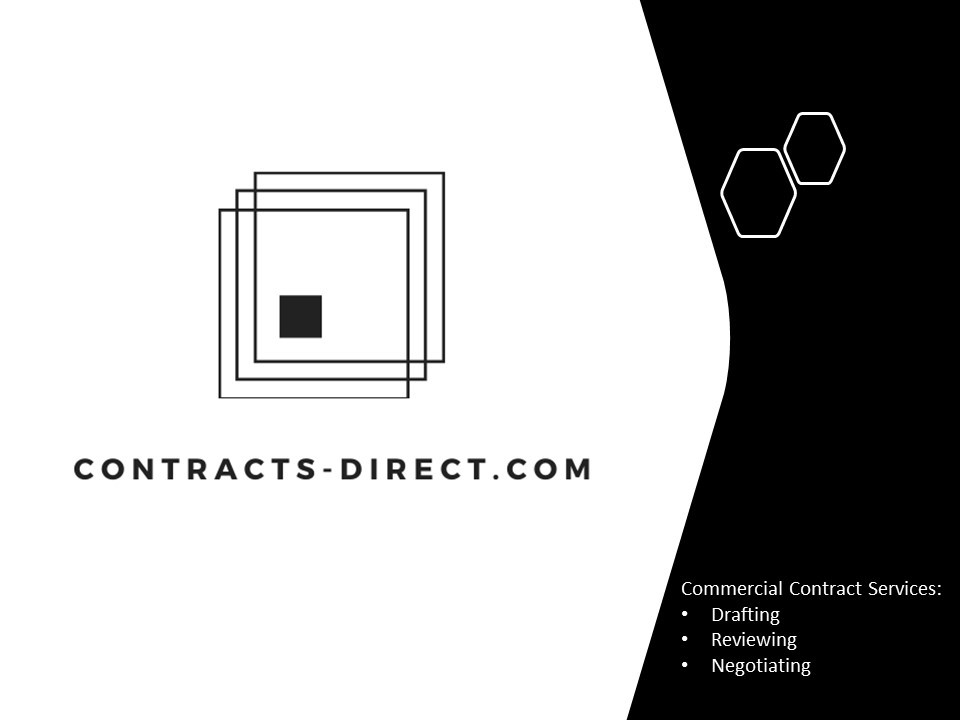
This could be simply because we think the job is not possible to do in the time you need it completed, or because of one of the following reasons (not exhaustive):
- Scope not sufficiently well defined
- Outside our skill base
- Conflict of interest
- Inadequate template
But our first approach will always be to try to assist if we can.
For more about our Services.
Please see our pricing options including Easy Pay.
Services are subject to our Terms of Business.
Contact us with you requirements.

How do we pay Contracts-Direct?
You will be provided with a quote for the drafting based on what you tell us you need. This will be a fixed fee wherever possible. If for any reason we can't give you a fixed fee quote, we will offer a time-based fee quote instead.
When you have agreed our fee quote you will be asked to pay the quoted fees before we start work.
Please see our pricing options including Easy Pay.
Services are subject to our Terms of Business.
Contact us with you requirements.

When you have agreed our fee quote you will be asked to pay the quoted fees before we start work.
Please see our pricing options including Easy Pay.
Services are subject to our Terms of Business.
Contact us with you requirements.

What is contract review and repair?
As the title suggests, there are two distinct parts to this:
Review: This is where a draft contract is looked at to assess it against your business needs for the deal. The contract document is marked up with comments to draw attention to provisions that need attention or to be changed. The review is based on the deal's commercial terms.
Repair: After the review, the contract is then repaired and amended so that it reflects the terms that you need in your deal. Sometimes, this can involve only small changes. In other cases, quite a few amendments are needed to knock a contract into shape. A separate legal review can be carried out if needed when the contract's commercial terms are settled.
Contact us with you requirements.
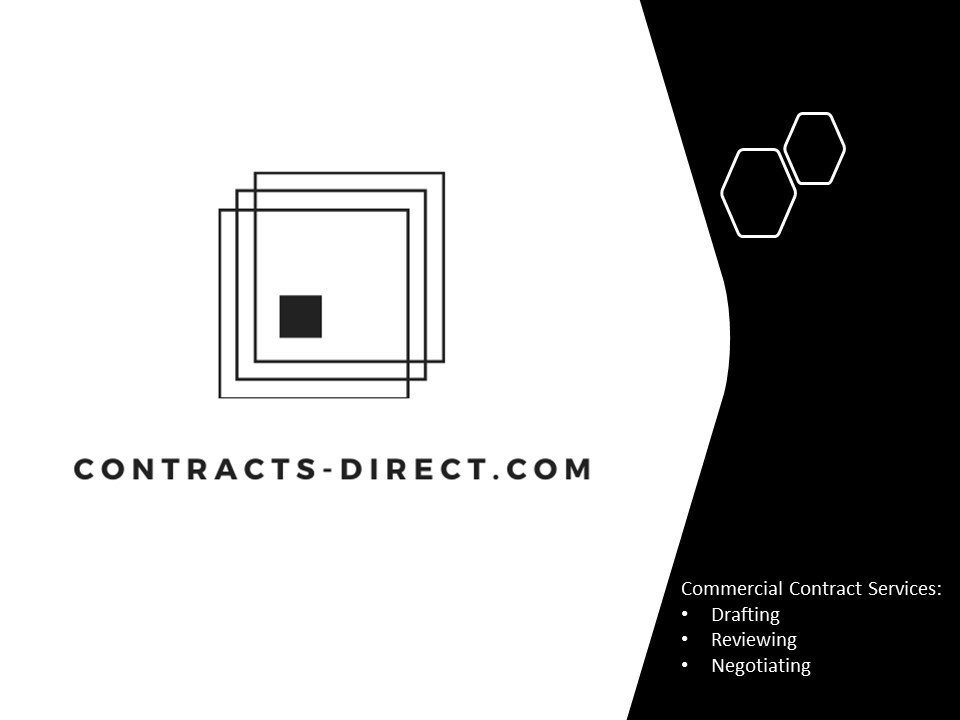
Review: This is where a draft contract is looked at to assess it against your business needs for the deal. The contract document is marked up with comments to draw attention to provisions that need attention or to be changed. The review is based on the deal's commercial terms.
Repair: After the review, the contract is then repaired and amended so that it reflects the terms that you need in your deal. Sometimes, this can involve only small changes. In other cases, quite a few amendments are needed to knock a contract into shape. A separate legal review can be carried out if needed when the contract's commercial terms are settled.
Contact us with you requirements.

What is contract administration?
We find that some SME clients require help with organising their business contracts and documentation for a variety of purposes, including:
Our approach is always governed by our clients' requirements and objectives.
Contact us with you requirements.
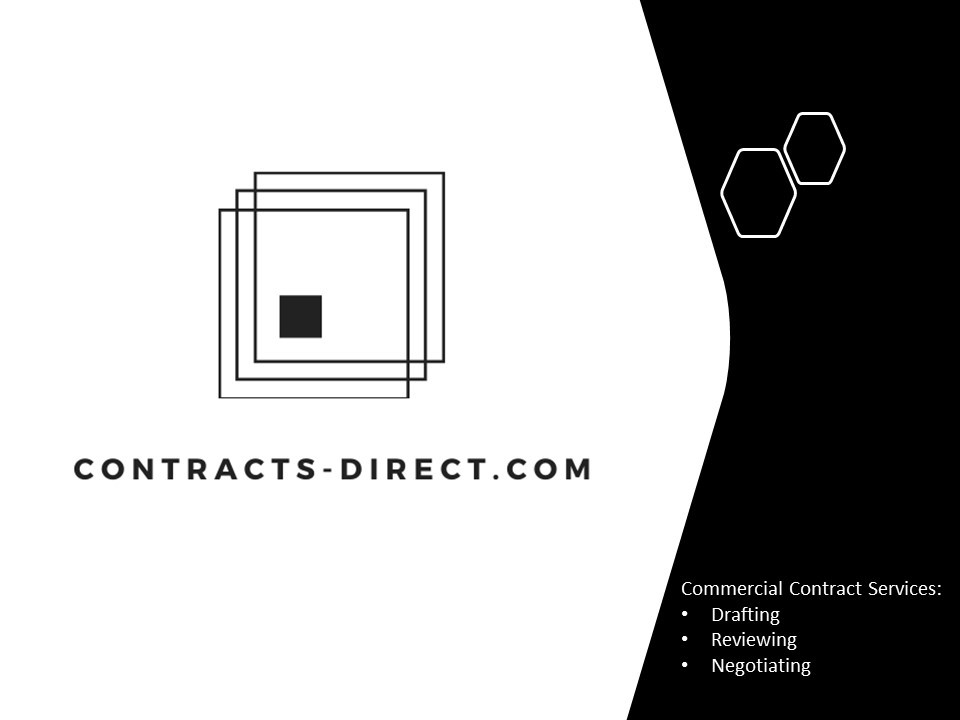
- review and update of terms and conditions
- preparing for a business sale
- arranging a joint venture
Our approach is always governed by our clients' requirements and objectives.
Contact us with you requirements.

Why does my business need a contract?
Contracts set out what has been agreed between your business and another business or person.
They are important because they help clarify and confirm what has been agreed in discussions (perhaps via meetings or emails).
They help avoid misunderstandings and confusion that can arise when discussions are under way and consolidate the essence of what you want to see agreed.
Contracts also give rise to rights and responsibilities between the contracting parties that can be relied on if and when their terms are not being kept by one side or the other.
You can read Commercial Contracts Guide, which gives more details on contracts.
Contact us with you requirements.
They are important because they help clarify and confirm what has been agreed in discussions (perhaps via meetings or emails).
They help avoid misunderstandings and confusion that can arise when discussions are under way and consolidate the essence of what you want to see agreed.
Contracts also give rise to rights and responsibilities between the contracting parties that can be relied on if and when their terms are not being kept by one side or the other.
You can read Commercial Contracts Guide, which gives more details on contracts.
Contact us with you requirements.
What is a commercial contract?
At its simplest, a commercial contract is any document that records an agreement between two or more entities (i.e. between businesses).
There are some legal requirements to make a valid contract and these are dealt with in one of our publications.
Contracts can also be made orally, but these are relatively rare and normally give rise to problems to prove their terms. They are not a recommended way to conduct commercial deals.
Some contracts are simple and not very complicated, others can be quite long and complex. Contracts or whatever size or complexity form the backbone of commercial relations.
Contracts also say something about how you conduct your business. How your present them and what they contain, can make the difference between getting a bad deal and a good one.
And, don't forget, that spending a bit of money on a decent contract is really investing in your business, as it is the basis of generating its income or purchasing goods and services.
Your are welcome to read Commercial Contracts Guide.
Contact us with you requirements.
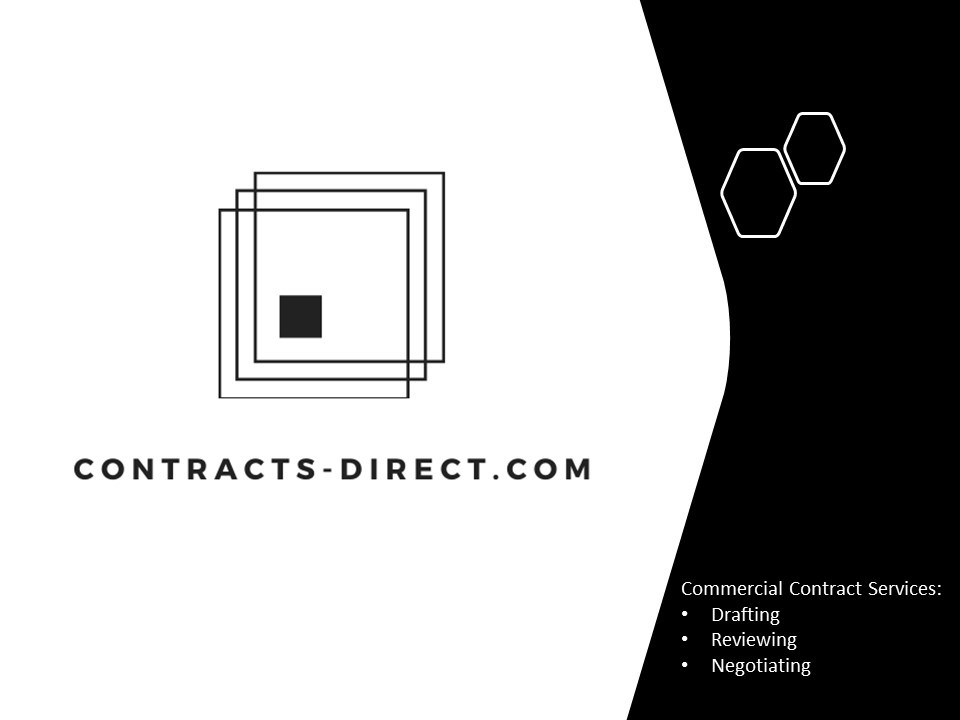
There are some legal requirements to make a valid contract and these are dealt with in one of our publications.
Contracts can also be made orally, but these are relatively rare and normally give rise to problems to prove their terms. They are not a recommended way to conduct commercial deals.
Some contracts are simple and not very complicated, others can be quite long and complex. Contracts or whatever size or complexity form the backbone of commercial relations.
Contracts also say something about how you conduct your business. How your present them and what they contain, can make the difference between getting a bad deal and a good one.
And, don't forget, that spending a bit of money on a decent contract is really investing in your business, as it is the basis of generating its income or purchasing goods and services.
Your are welcome to read Commercial Contracts Guide.
Contact us with you requirements.

How is contract drafting done?
Contract drafting, the way we do it, starts with you telling us your requirements. We'll help you through this process by asking questions to get an understanding of what you need.
Based on what you tell us, we'll create (a process called drafting) the document for you. This is a bespoke process and will take time. We aim to get a document prepared within three to four days, sometimes sooner, of finalising your instructions and agreeing our terms and receiving payment.
You may want changes made to your document when you have read it through. We can handle those for you as well. We do make a charge for amendments and updates of the document we deliver to you.
If you need further help from us to get the deal done, you can ask us to help with negotiation as well.
Please see our pricing and payment policy.
Contact us with you requirements.
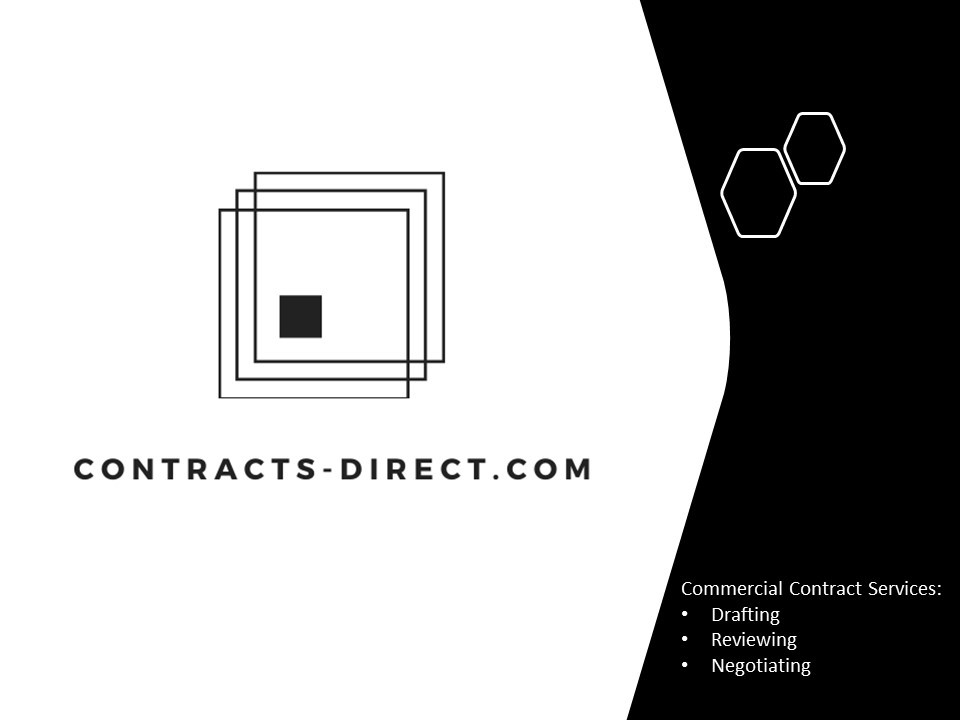
Based on what you tell us, we'll create (a process called drafting) the document for you. This is a bespoke process and will take time. We aim to get a document prepared within three to four days, sometimes sooner, of finalising your instructions and agreeing our terms and receiving payment.
You may want changes made to your document when you have read it through. We can handle those for you as well. We do make a charge for amendments and updates of the document we deliver to you.
If you need further help from us to get the deal done, you can ask us to help with negotiation as well.
Please see our pricing and payment policy.
Contact us with you requirements.

How do I find a commercial contract template?
If you don't already have a contract template for your business, don't worry, we can help with that.
Let us know what you need in your own words and we will do our best to get a basic draft document ready for you.
Or, go to the business documents section of our sister website LawDocs4All.com where you will find information about a whole range of useful templates, along with explanations of what they are for.
You can find, buy and download to your own computer the template that you want, then send it to us with whatever instructions you want and we will then prepare it for your specific business needs.
The website has suggested business document collections that are designed specially to help businesses to get a range of documents they need. This is because we often find that a business will need more than just a single contract or document to fulfil a single or linked purpose.
These collections come with the added advantage of additional discounts- so buying say, three, documents at a time is cheaper than buying them separately.
Examples of the documents bundles are:
Templates For Clubs & Associations
Selected legal templates for use by Clubs & Associations including: Club Rules & Constitution, Employment Contracts, Web Design Agreement, Terms for a community website
Templates For Creative Works
Selected legal templates for creative works including: Technical Writing, Photography, Software Development, Product Development, Graphic design, Architecture, Fashion and Industrial Design.
Templates For Entrepreneurs
Selected legal templates for entrepreneurs starting up their company business including: Shareholders' Agreement, Articles of Association, Director's Service Contract, Company Administration Documents. Friends & Family Loan Agreement, Bookkeeping and Secretarial Services Agreements.
Templates For IT Services
Selected legal templates for Corporate IT Consultancy, Individual Consultancy Contract, Subcontractor Consultancy, Confidentiality Agreement.
Templates For SMEs
Selected legal templates for the following SME categories:
SME Starter
SME Growth
SME Expansion & M&A
Templates For Employers
A selection of templates for use by employers including employment contracts, secondment agreements.
Remember that our drafts do not come with legal advice, so if you need any before using the contract or other document, let us know and we will point you in the direction of a lawyer.
The legal document templates in our library are all supplied by specialist online legal document publishers, who have been selected by us for their range and quality.
NetLawman.co.uk is our selected supplier for the business templates found on the Business Docs Portal. These are single documents accessed via our portal, and additional documents can be purchased if required, to which a higher discount applies. The prices for individual documents are exclusive to LawDocs4All.
With NetLawman's help, we are able to offer great value for money across a broad & diverse spectrum of business legal documents.
Our supplier selection criteria means that you receive high quality legal templates written in plain English and at a fraction of the cost if you were to approach a law firm.
NetLawman regularly receives top rated reviews for its documents and service levels and with good reason we feel. It is not the only legal document supplier, but its its careful attention to product detail and its professional approach sets it apart. It is also run, as is Contracts-Direct.com and LawDocs4All.com, by highly experienced lawyers with many years of practise behind them.
There are detailed guide notes provided for each template, explaining how and when they are to be used.
As a further assurance of quality, NetLawman is a founding member of the Association of Publishers of Online Legal Documents (APOD), which exists to:
Let us know what you need in your own words and we will do our best to get a basic draft document ready for you.
Or, go to the business documents section of our sister website LawDocs4All.com where you will find information about a whole range of useful templates, along with explanations of what they are for.
You can find, buy and download to your own computer the template that you want, then send it to us with whatever instructions you want and we will then prepare it for your specific business needs.
The website has suggested business document collections that are designed specially to help businesses to get a range of documents they need. This is because we often find that a business will need more than just a single contract or document to fulfil a single or linked purpose.
These collections come with the added advantage of additional discounts- so buying say, three, documents at a time is cheaper than buying them separately.
Examples of the documents bundles are:
Templates For Clubs & Associations
Selected legal templates for use by Clubs & Associations including: Club Rules & Constitution, Employment Contracts, Web Design Agreement, Terms for a community website
Templates For Creative Works
Selected legal templates for creative works including: Technical Writing, Photography, Software Development, Product Development, Graphic design, Architecture, Fashion and Industrial Design.
Templates For Entrepreneurs
Selected legal templates for entrepreneurs starting up their company business including: Shareholders' Agreement, Articles of Association, Director's Service Contract, Company Administration Documents. Friends & Family Loan Agreement, Bookkeeping and Secretarial Services Agreements.
Templates For IT Services
Selected legal templates for Corporate IT Consultancy, Individual Consultancy Contract, Subcontractor Consultancy, Confidentiality Agreement.
Templates For SMEs
Selected legal templates for the following SME categories:
SME Starter
SME Growth
SME Expansion & M&A
Templates For Employers
A selection of templates for use by employers including employment contracts, secondment agreements.
Remember that our drafts do not come with legal advice, so if you need any before using the contract or other document, let us know and we will point you in the direction of a lawyer.
The legal document templates in our library are all supplied by specialist online legal document publishers, who have been selected by us for their range and quality.
NetLawman.co.uk is our selected supplier for the business templates found on the Business Docs Portal. These are single documents accessed via our portal, and additional documents can be purchased if required, to which a higher discount applies. The prices for individual documents are exclusive to LawDocs4All.
With NetLawman's help, we are able to offer great value for money across a broad & diverse spectrum of business legal documents.
Our supplier selection criteria means that you receive high quality legal templates written in plain English and at a fraction of the cost if you were to approach a law firm.
NetLawman regularly receives top rated reviews for its documents and service levels and with good reason we feel. It is not the only legal document supplier, but its its careful attention to product detail and its professional approach sets it apart. It is also run, as is Contracts-Direct.com and LawDocs4All.com, by highly experienced lawyers with many years of practise behind them.
There are detailed guide notes provided for each template, explaining how and when they are to be used.
As a further assurance of quality, NetLawman is a founding member of the Association of Publishers of Online Legal Documents (APOD), which exists to:
- promote the sale of online legal and business document templates;
- educate the public about the need for legal documents to protect their interests, and in the online availability of professionally written and affordable template contracts;
- promote and represent the interests of the Association and its members;
- ensure professional standards for customers and the public in accordance with the APOD Code of Practice.
Why is it important to check draft contracts?
When you have created or received a draft contract document, it's very important to get it checked over against your own requirements.
Remember that:
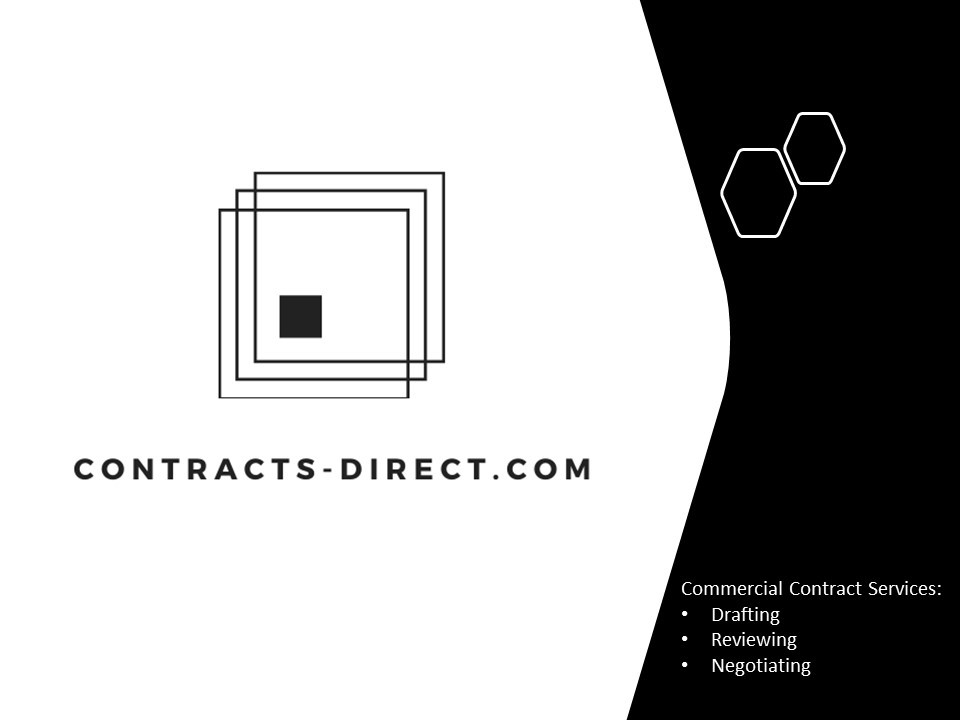
Remember that:
- A document you use from a previous deal will not necessarily meet the needs of the new deal you are trying to do;
- When you use a document supplied by the other side, it will usually be written in their favour and not in yours.
- Unless you carefully check all the terms you could be at a big disadvantage when the deal is finally agreed.

What's important in contract negotiations?
Most contracts go through some sort of negotiation process. This can be via email, in meetings, in a pub or wine bar, on a car drive etc.
It can start with a simple chat or in a more formal process, where one business approaches another to do a deal. If the deal is going to go ahead, at some point a contract document is going to required.
There is a process to this and it involves a series of exchanges with your counter-party. Handling this stage can determine how you get to a successful conclusion.
Ignoring the basics can result in a bad deal for you and your business.
Preparing the draft agreement and presenting it to the other side, with explanations of key terms and changes, can be vital to getting a deal done that favours your business.
Contact us with you requirements..
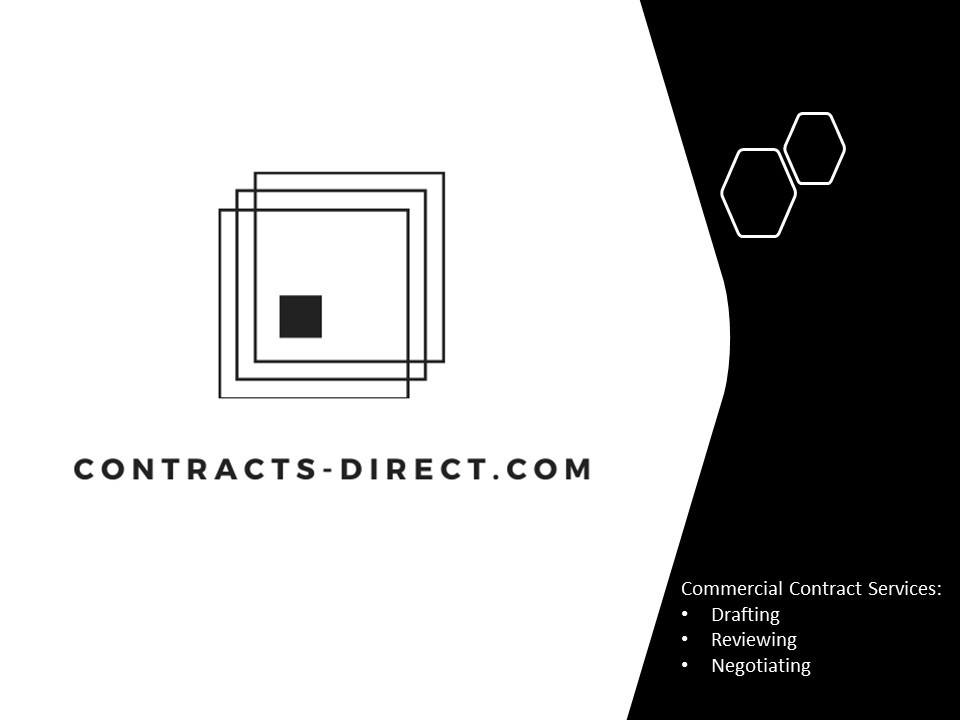
It can start with a simple chat or in a more formal process, where one business approaches another to do a deal. If the deal is going to go ahead, at some point a contract document is going to required.
There is a process to this and it involves a series of exchanges with your counter-party. Handling this stage can determine how you get to a successful conclusion.
Ignoring the basics can result in a bad deal for you and your business.
Preparing the draft agreement and presenting it to the other side, with explanations of key terms and changes, can be vital to getting a deal done that favours your business.
Contact us with you requirements..

What are some common contract mistakes?
In our many years of experience in contract negotiating and drafting we have come across many mistakes and errors, too numerous to mention here. Some of the more common (and avoidable) ones are:
Contact us with you requirements.

- Not naming the correct parties in the contract (it happens more often than you think!)
- Inadequate or inaccurate 'recitals' or introductory points
- Inaccurate definitions of contract terms
- Inadequate definitions of contract terms
- Incorrect commercial terms
- Spelling and grammar errors & omissions
- Failing to fully check through the contract before signing
- Inappropriate 'boiler plate' clauses
- Incorrect numbering and cross-referencing of clauses
- Failing to properly date a contract
- Not signing contracts under a correct authority
Contact us with you requirements.

What is the structure of a commercial contract?
The essential parts to a commercial contract include the following:
Parties
The names, addresses (registered address in the case of companies) are set out at the start of the contract.The parties also are named at the end as well where they sign it.
Each party will be given a short name for the purposes of the entire contract, such as 'Seller', 'Buyer', 'Client', 'Contractor', or each may be identified by their initials e.g. Stefan Lithgow ('SL").
It's vital that the correct parties are named in the contract. This means making sure that within a group of businesses, the one that is to be responsible for undertaking the contract obligations.
An example of how the parties may be described:
"THIS AGREEMENT is made the [xx] day of [month] 2020
BETWEEN:
(1) [Name] a company registered in the United Kingdom under number [xxxxxxxxxx] whose registered office is at [xxxxxxxxxxxxxxxxxxxxxxxxxxxxxxxx] (the “Company”) and
(2) [Name] a company registered in the United Kingdom under number [xxxxxxxxxx] whose registered office is at [xxxxxxxxxxxxxxxxxxxxxxxxxxxxxxxx] (the “Client”)"
Preamble or Recitals
This is the part of the contract that appears immediately after the names and addresses of the parties and before the Interpretation or Definitions clause.
The recitals set the scene, so to speak, and 'recite' in a fairly summary form how and why the parties have got to where they are, what the subject matter of their deal is and that they and have decided to make an agreement.
Sometimes, but not always, the recitals will form part of the agreed text of the contract. Usually, this is to ensure that any pre-contract representations that may have been made between the parties are expressly agreed to form part of their agreement.
An example of how recitals may be worded:
"WHEREAS:
(1) The Manufacturer manufactures the Products, as described in Schedule 1 and now wishes to sell the Products to the Client, together with certain services to maintain the Products.
(2) The Client wishes to purchase the Products from the Manufacturer and to distribute the Products in the Territory under its own brand names.
(3) The Manufacturer has agreed to fabricate and deliver the Products to the Client and provide the Services to the Client in accordance with the terms and conditions of this Contract.
IT IS AGREED as follows:"
Interpretation or Definitions
These come immediately after the recitals and are usually numbered Clause 1 in commercial contracts.
They are a key part of the mechanics of the agreement and must always be carefully crafted to ensure accuracy throughout the document.
All the words and phrases that are going to be used frequently in the contract are given a specific meaning to enable the document to flow when it is read and interpreted.
Some fairly typical examples of defined terms are to illustrate what they can look like are:
Each contract will need to have its own unique set of defined terms to make it work properly and to avoid misunderstandings and disputes.
Express Terms
These are the real guts of a commercial contract and are to be distinguished from the 'boiler plate' clauses (see next).
The parties will have set about coming to a broad understanding of what they are agreeing to through meetings and other communications, and the main body of the contract will set out the details.
Very often, the parties will find that these clauses contain more than they expected to see, based on their own, often shorthand pre-contract exchanges. This is because contracts usually aim to protect parties' interests and to cover more eventualities than the parties themselves have had either the time, inclination or ability to properly consider.
A not untypical list of clause topics (e.g. for a services agreement) will contain the details of what is being agreed might look something like the following:
'Boiler Plate' Clauses
This expression is often used when a contract is being drafted or referred to and it simply means provisions in a contract that are generally accepted as being a common feature in most forms of commercial contract.
The exact wording of 'boiler plate' clauses will likely vary from contract to contract, but whatever their exact formulation, they will essentially cover the same ground.
Boiler plate usually finds its place towards the end of a contract and rounds it off as a document. Often, the last two boiler plate clauses deal with the contract’s governing law, the jurisdiction and the method of resolving disputes.
Why does a contract need Boiler Plate clauses?
The selection of Boiler Plate clauses depends on several matters including the type and subject matter of the contract and the parties’ respective interests.
Boilerplate Examples
The following are some common provisions that you might expect to find in a commercial contract, with some example wordings:
Confidentiality: imposes confidentiality obligations on the parties and can vary a great deal depending on the information and be protected and for how long, e.g.:
“Each Party undertakes that it shall, at all times during the continuance of this Agreement [and for 2 years after its termination] keep confidential all Confidential Information and not disclose any Confidential Information to any other party.”
Costs: establishes who pays for the preparation of the contract and can be varied depending on what is agreed, e.g.:
“The costs and expenses (including professional, legal and accountancy expenses) of the preparation, negotiation and execution of this Agreement and associated documentation shall be borne by the [Company] [by the parties in equal proportions].”
Duration: states the length of time the contract is to be in force for, e.g.:
“This Agreement shall continue in full force and shall bind each of the Parties for so long as he or she shall be the beneficial owner and/or registered member in respect of any Shares in the Company until the date of commencement of the Company’s winding up.”
Force Majeure: provides that if circumstances arise that are outside the control of the parties then their rights and obligations can be suspended for an agreed period, e.g.:
“No Party to this Agreement shall be considered to be in breach of or liable for any failure or delay in performing their obligations where such failure or delay is due to Force Majeure [which term will be defined in the Definitions clause]”
Governing Law: establishes the system of law to be used to interpret the contract and any disputes arising under it, e.g.:
“This Agreement shall be governed by and construed in accordance with the laws of England and Wales.”
Jurisdiction: establishes the court system that will be used to determine a dispute under the contract, e.g.:
“All disputes or differences between the Parties arising under or in relation to this Contact shall be referred to and finally decided by the Courts of England and Wales.”
Non-Assignment: prohibits assignment of a contract or part of a contract to another legal entity, e.g.:
“This Agreement is personal to the parties and neither party may assign any of its rights hereunder, or sub-contract or otherwise delegate any of its obligations hereunder, except with the prior written consent of the other party.”
Notices: provides the methods by which the parties must give a contractual notice to one another and the clause can take many different forms, e.g.:
“All notices under this Contract shall be in writing and be deemed duly given if signed by, or on behalf of, a duly authorised officer of the Party giving the notice.”
A boilerplate notice clause may also include a deemed notice provision, such as:
“Notices shall be deemed to have been duly given under this Contract:
a. when delivered, if delivered by courier or other messenger (including registered mail) during normal business hours of the recipient; or
b. when sent, if transmitted by facsimile or e-mail and a successful transmission report or return receipt is generated; or
c. on the third Business Day following mailing, if mailed by national ordinary mail, postage prepaid; or
d. on the fifth Business Day following mailing, if mailed by airmail, postage prepaid.
In each case notices shall be addressed to the most recent address, e-mail address, or facsimile number notified to the other Party.”
No Waiver: preserves the parties’ rights if they have failed to exercise them or waived them for an earlier breach by the other party who then commits a later one, e.g.:
“No failure or delay by either Party in exercising any of its rights under this Contract shall be deemed to be a waiver of that right, and no waiver by either Party of a breach of any provision of this Agreement shall be deemed to be a waiver of any subsequent breach of the same or any other provision.”
Relationship of the Parties: establishes that the parties are only in a contractual relationship and no other type, e.g.:
“Nothing in this Agreement shall constitute or be deemed to constitute a partnership, joint venture, agency, or other fiduciary relationship between the Parties other than the contractual relationship expressly provided for in this Agreement.”
Severance: permits survival of the contract even if some of its provisions are held by a court to be invalid or unenforceable, e.g.:
“If any provision of this Contract is held by any court or other competent authority to be invalid or unenforceable in whole or in part, this Contract shall continue to be valid as to its other provisions and the remainder of the affected provision.”
Contact us with you requirements.
Parties
The names, addresses (registered address in the case of companies) are set out at the start of the contract.The parties also are named at the end as well where they sign it.
Each party will be given a short name for the purposes of the entire contract, such as 'Seller', 'Buyer', 'Client', 'Contractor', or each may be identified by their initials e.g. Stefan Lithgow ('SL").
It's vital that the correct parties are named in the contract. This means making sure that within a group of businesses, the one that is to be responsible for undertaking the contract obligations.
An example of how the parties may be described:
"THIS AGREEMENT is made the [xx] day of [month] 2020
BETWEEN:
(1) [Name] a company registered in the United Kingdom under number [xxxxxxxxxx] whose registered office is at [xxxxxxxxxxxxxxxxxxxxxxxxxxxxxxxx] (the “Company”) and
(2) [Name] a company registered in the United Kingdom under number [xxxxxxxxxx] whose registered office is at [xxxxxxxxxxxxxxxxxxxxxxxxxxxxxxxx] (the “Client”)"
Preamble or Recitals
This is the part of the contract that appears immediately after the names and addresses of the parties and before the Interpretation or Definitions clause.
The recitals set the scene, so to speak, and 'recite' in a fairly summary form how and why the parties have got to where they are, what the subject matter of their deal is and that they and have decided to make an agreement.
Sometimes, but not always, the recitals will form part of the agreed text of the contract. Usually, this is to ensure that any pre-contract representations that may have been made between the parties are expressly agreed to form part of their agreement.
An example of how recitals may be worded:
"WHEREAS:
(1) The Manufacturer manufactures the Products, as described in Schedule 1 and now wishes to sell the Products to the Client, together with certain services to maintain the Products.
(2) The Client wishes to purchase the Products from the Manufacturer and to distribute the Products in the Territory under its own brand names.
(3) The Manufacturer has agreed to fabricate and deliver the Products to the Client and provide the Services to the Client in accordance with the terms and conditions of this Contract.
IT IS AGREED as follows:"
Interpretation or Definitions
These come immediately after the recitals and are usually numbered Clause 1 in commercial contracts.
They are a key part of the mechanics of the agreement and must always be carefully crafted to ensure accuracy throughout the document.
All the words and phrases that are going to be used frequently in the contract are given a specific meaning to enable the document to flow when it is read and interpreted.
Some fairly typical examples of defined terms are to illustrate what they can look like are:
| “Business” | The business of the Company shall be the undertaking of <<Insert description of business of Company>> and such other business as may be determined from time to time by the Board in accordance with this Agreement; |
| “Shareholder” | means, the Existing Shareholders, the Subscribers, the Principal Investor and any person to whom they may transfer their respective Shares pursuant to the Articles and this Agreement and “Shareholder” shall mean any one of them; |
| “Confidential Information” | means all business, technical, financial or other information created or exchanged between the Parties in the course of fulfilling their obligations under this Agreement; |
| “Term” | means the term of this Agreement, as defined in Clause [ ] of this Agreement. |
Each contract will need to have its own unique set of defined terms to make it work properly and to avoid misunderstandings and disputes.
Express Terms
These are the real guts of a commercial contract and are to be distinguished from the 'boiler plate' clauses (see next).
The parties will have set about coming to a broad understanding of what they are agreeing to through meetings and other communications, and the main body of the contract will set out the details.
Very often, the parties will find that these clauses contain more than they expected to see, based on their own, often shorthand pre-contract exchanges. This is because contracts usually aim to protect parties' interests and to cover more eventualities than the parties themselves have had either the time, inclination or ability to properly consider.
A not untypical list of clause topics (e.g. for a services agreement) will contain the details of what is being agreed might look something like the following:
- Scope of Services
- Provision of the Services
- Key-personnel
- Home Office Support
- Service Levels & KPIs
- Fees and Payment
- Term
- Resources
- Training
- Reporting
- Intellectual Property
- Liability and Indemnity
- Schedules:
1. Systems
2. Training Materials
3. Telephone Numbers
4. Resources
5. Reporting procedures
'Boiler Plate' Clauses
This expression is often used when a contract is being drafted or referred to and it simply means provisions in a contract that are generally accepted as being a common feature in most forms of commercial contract.
The exact wording of 'boiler plate' clauses will likely vary from contract to contract, but whatever their exact formulation, they will essentially cover the same ground.
Boiler plate usually finds its place towards the end of a contract and rounds it off as a document. Often, the last two boiler plate clauses deal with the contract’s governing law, the jurisdiction and the method of resolving disputes.
Why does a contract need Boiler Plate clauses?
The selection of Boiler Plate clauses depends on several matters including the type and subject matter of the contract and the parties’ respective interests.
Boilerplate Examples
The following are some common provisions that you might expect to find in a commercial contract, with some example wordings:
Confidentiality: imposes confidentiality obligations on the parties and can vary a great deal depending on the information and be protected and for how long, e.g.:
“Each Party undertakes that it shall, at all times during the continuance of this Agreement [and for 2 years after its termination] keep confidential all Confidential Information and not disclose any Confidential Information to any other party.”
Costs: establishes who pays for the preparation of the contract and can be varied depending on what is agreed, e.g.:
“The costs and expenses (including professional, legal and accountancy expenses) of the preparation, negotiation and execution of this Agreement and associated documentation shall be borne by the [Company] [by the parties in equal proportions].”
Duration: states the length of time the contract is to be in force for, e.g.:
“This Agreement shall continue in full force and shall bind each of the Parties for so long as he or she shall be the beneficial owner and/or registered member in respect of any Shares in the Company until the date of commencement of the Company’s winding up.”
Force Majeure: provides that if circumstances arise that are outside the control of the parties then their rights and obligations can be suspended for an agreed period, e.g.:
“No Party to this Agreement shall be considered to be in breach of or liable for any failure or delay in performing their obligations where such failure or delay is due to Force Majeure [which term will be defined in the Definitions clause]”
Governing Law: establishes the system of law to be used to interpret the contract and any disputes arising under it, e.g.:
“This Agreement shall be governed by and construed in accordance with the laws of England and Wales.”
Jurisdiction: establishes the court system that will be used to determine a dispute under the contract, e.g.:
“All disputes or differences between the Parties arising under or in relation to this Contact shall be referred to and finally decided by the Courts of England and Wales.”
Non-Assignment: prohibits assignment of a contract or part of a contract to another legal entity, e.g.:
“This Agreement is personal to the parties and neither party may assign any of its rights hereunder, or sub-contract or otherwise delegate any of its obligations hereunder, except with the prior written consent of the other party.”
Notices: provides the methods by which the parties must give a contractual notice to one another and the clause can take many different forms, e.g.:
“All notices under this Contract shall be in writing and be deemed duly given if signed by, or on behalf of, a duly authorised officer of the Party giving the notice.”
A boilerplate notice clause may also include a deemed notice provision, such as:
“Notices shall be deemed to have been duly given under this Contract:
a. when delivered, if delivered by courier or other messenger (including registered mail) during normal business hours of the recipient; or
b. when sent, if transmitted by facsimile or e-mail and a successful transmission report or return receipt is generated; or
c. on the third Business Day following mailing, if mailed by national ordinary mail, postage prepaid; or
d. on the fifth Business Day following mailing, if mailed by airmail, postage prepaid.
In each case notices shall be addressed to the most recent address, e-mail address, or facsimile number notified to the other Party.”
No Waiver: preserves the parties’ rights if they have failed to exercise them or waived them for an earlier breach by the other party who then commits a later one, e.g.:
“No failure or delay by either Party in exercising any of its rights under this Contract shall be deemed to be a waiver of that right, and no waiver by either Party of a breach of any provision of this Agreement shall be deemed to be a waiver of any subsequent breach of the same or any other provision.”
Relationship of the Parties: establishes that the parties are only in a contractual relationship and no other type, e.g.:
“Nothing in this Agreement shall constitute or be deemed to constitute a partnership, joint venture, agency, or other fiduciary relationship between the Parties other than the contractual relationship expressly provided for in this Agreement.”
Severance: permits survival of the contract even if some of its provisions are held by a court to be invalid or unenforceable, e.g.:
“If any provision of this Contract is held by any court or other competent authority to be invalid or unenforceable in whole or in part, this Contract shall continue to be valid as to its other provisions and the remainder of the affected provision.”
Contact us with you requirements.
Brexit- impact on business contracts?
The UK left the EU on 31st January and has entered a 11 month transition period while negotiations over the future relationship of the EU and UK proceed.
During the transition period, some things will change and others will stay the same- http://bit.ly/2GzRcfQ
EU law will continue to apply in the UK, as will rulings of the Court of Justice of the European Union, and the UK will be required to follow the same rules as an EU member state.
Email us with you requirements.
Here are some key impacts of Brexit to be considered.
Commercial Contracts
There are relevant concerns for contracts already in place as well as for upcoming contracts – what are the provisions a contracting party should be looking for, and how can they best safeguard their position?
English contract law will not be affected during the transition period by the UK’s exit from the EU. It should be unnecessary to make changes to commercial agreements to deal with the UK’s exit during the transition period. Any changes to English contract law will depend on the outcome of the UK’s negotiations with the EU during transition.
It is recommended that businesses review existing commercial contracts and consider planning for future contracts, to see what (if any) impact any aspect of Brexit might have- e.g. increased tariffs or customs checks, currency exchange rates or restrictions on employment of EU nationals.
Each business will be affected differently so any Brexit related changes to contracts need to be considered carefully.
Options for existing contracts that are going to run on after transition may include termination or negotiating amendments to remain compliant.
For new contracts, consider clauses to safeguard against uncertainty, e.g. termination or a price change if a Brexit-related law or regulation.
Some useful recent recommendations that we have spotted from lawyers include:
"Brexit is likely to have a major impact on a range of issues with the potential to affect the parties' commercial bargain, such as tariffs on goods, exchange rates, VAT and changes to the framework of law relating to the parties' activities under the contract." Travers Smith
"Review mechanisms for pricing, given the potential for new import tariffs, VAT changes and other costs of trading. If the currency of the contract is sterling, look for any wording addressing serious fluctuations in its value. There may also be provisions for both parties conducting reviews and renegotiation of prices, especially in contracts with a particularly lengthy term." Charles Russell Speechlys
"Do not rely on existing contractual provisions – such as force majeure and material adverse change (MAC) clauses – or the English common law doctrine of frustration to resolve any difficulty that may arise in the performance of a contract following an event connected with Brexit, as they are unlikely to work." HFW
"Contractual interpretation will change post-Brexit. References to, for example, the ‘territory of the European Union’ or the application of a specific term of EU law which has been superseded by UK legislation, may create the potential for disputes. Law and Jurisdiction clauses may not be recognised by the EU courts post-Brexit." HFW
Contact us with you requirements.
